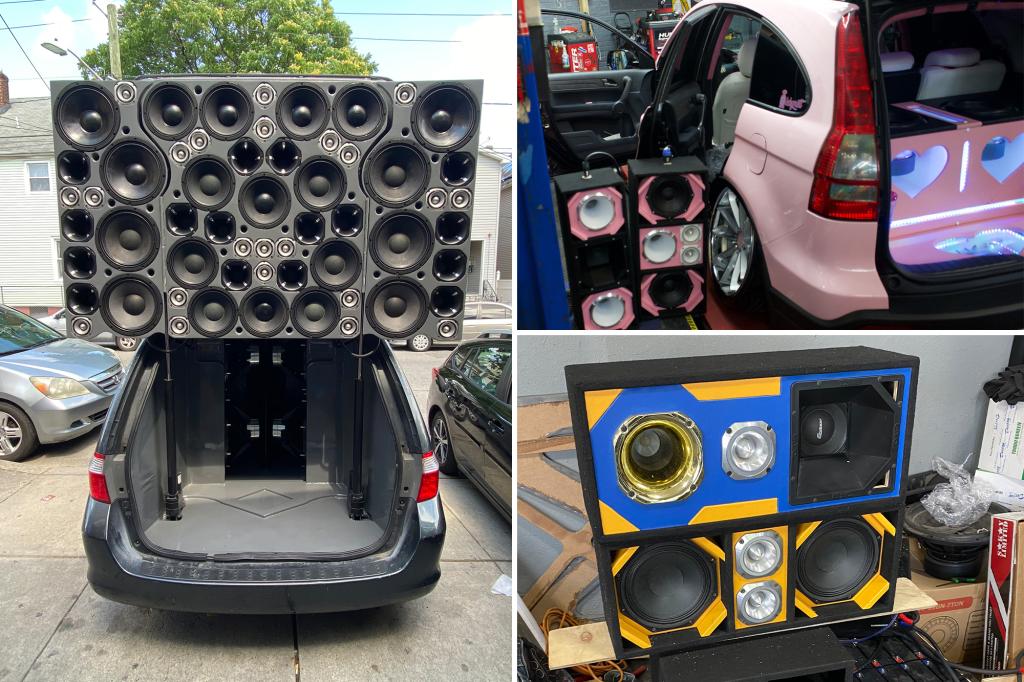Just hear them out.
The owners of a vehicle audio shop that installs some of the gigantic “churchero” speaker systems at the root of obnoxiously loud car meetups in the Big Apple are asking city residents and lawmakers to cool their engines.
Luis Colon and his wife, Jeanette Beato, owners of Allstar Auto Solutions in Passaic, NJ, said that if appropriately regulated, these events could be “family-oriented” and raise money for charities.
“Ninety-nine of the guys involved in car music don’t want [trouble],” Colon insisted to The Post after its report on the dangers of the illegal car meetups.
Colon and Beato, both Bronx natives, said their shop had been thriving on providing the “boom systems,” which can cost anywhere from $1,500 to $60,000. But recent negativity involving the “car music” community has slowed business to about half of what it was.
Critics “are making it seem like it’s worse than drug dealers right now,” Colon said of the meet-ups.
The couple said some of their customers come from as far away as Texas, Missouri and Florida to get their speaker installations. They promote their business at organized car meetups, including one gathering of more than 400 cars in Middletown, NY, in May and an upcoming show in Atlantic City, NJ, in August, which are permitted and have police on hand to support traffic and other safety measures.
“They have events like this outside of the city, and you even see families there,” Beato said. “Our clientele is all families.”
The pair is calling on “car music” enthusiasts and community leaders to create clear parameters and “better administration” for hosting festivals featuring their giant audio systems — including in designated areas and at appropriate hours.
“It’s something where a lot of money could be made and put to good use,” said Colon, 46. “Give us a place, we’ll make money and donate to charity.”
Nick Terzo, who grew up in the Hudson Valley and lives in Miami, runs a car-show company called Clean Culture that hosts approximately 35 events annually in the United States, Canada and Puerto Rico.
He said his events feature some booming “churchero” systems but that he’s figured a way to abide by the law by keeping them in designated areas, including over the July Fourth weekend at a minor-league baseball stadium in Lakewood, NJ, that attracted roughly 2,000 people.
“I’m hearing some loud music,” acknowledged Terzo, 32. “it might not affect me as much, but I can understand where people could complain and have a problem with it.
“I want to give these people a platform to come out and showcase their cars and get these guys off the streets where [their sound systems] might cause a hassle to the average person.”
But Colon and Beato said it’s not only critics who are damaging business.
“The tariffs that are going on are hurting our business as well,” Colon said. “There was a hundred-dollar increase on some items from May to June.”
Victor Martinez, who works at Inspire Auto Sound and Detail in Motte Haven in The Bronx, agreed that drivers are thinking twice about installing “churchero” systems and that tariffs on speakers are hurting sales, too.
“The stuff that used to cost 30 or 40 bucks now costs 90 or a hundred plus tax” now, Martinez said. “It’s bad.”
Residents in Queens, The Bronx, and Nassau County, LI, have told The Post they’ve been dealing with long-standing disturbances caused by “car music” meetups. They are calling on local lawmakers to empower the NYPD to confiscate and aggressively destroy “churchero” systems.
“If the offending sound device is detachable from the vehicle, the NYPD may seize the device itself,” an Police Department rep told The Post in an e-mailed statement. “However, if the device is an integrated, attached component of the vehicle, the vehicle may be seized.
“If the offending sound device is coming from a moving vehicle, and it can be safely stopped, the previous criteria would be applied.”
But Colon and Beato, who say “music is good for the soul,” explained they are hoping for harmony between the “car music” community and the public.
“If we could speak to somebody willing to hear us out, we’ll have much better results out of all of this,” Colon said. “But if we don’t find anybody to listen, people will keep going outside playing music when they’re not supposed to, getting tickets and getting arrested.”
Read the full article here


